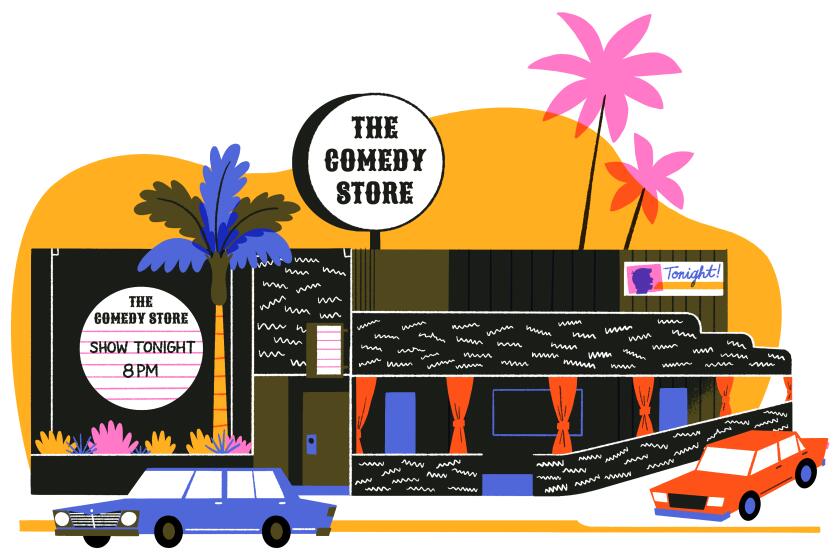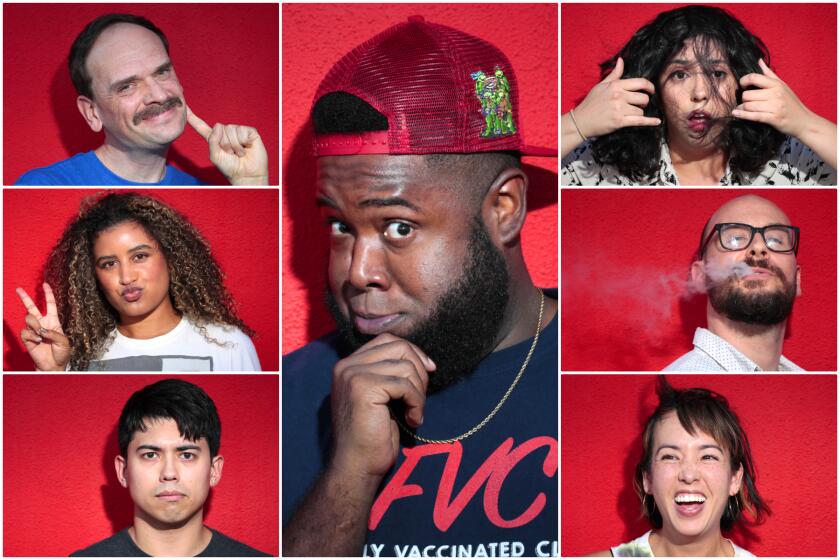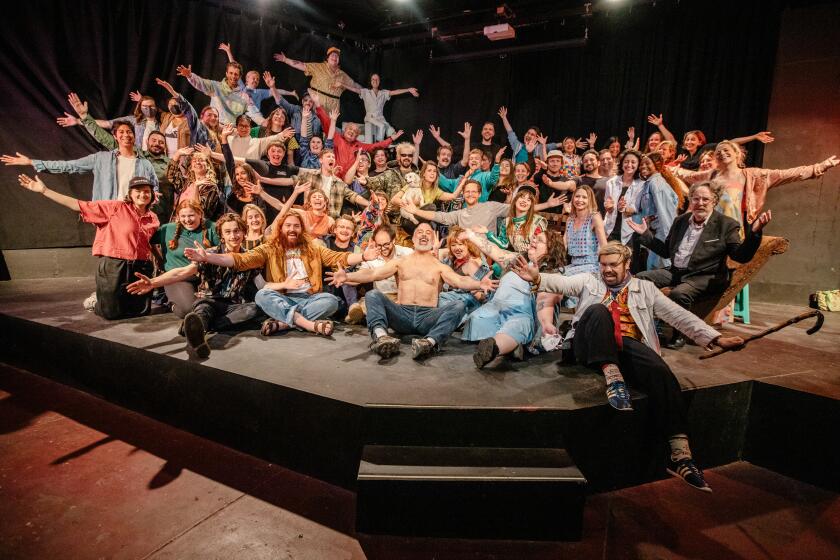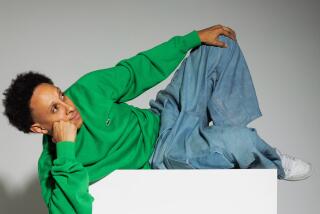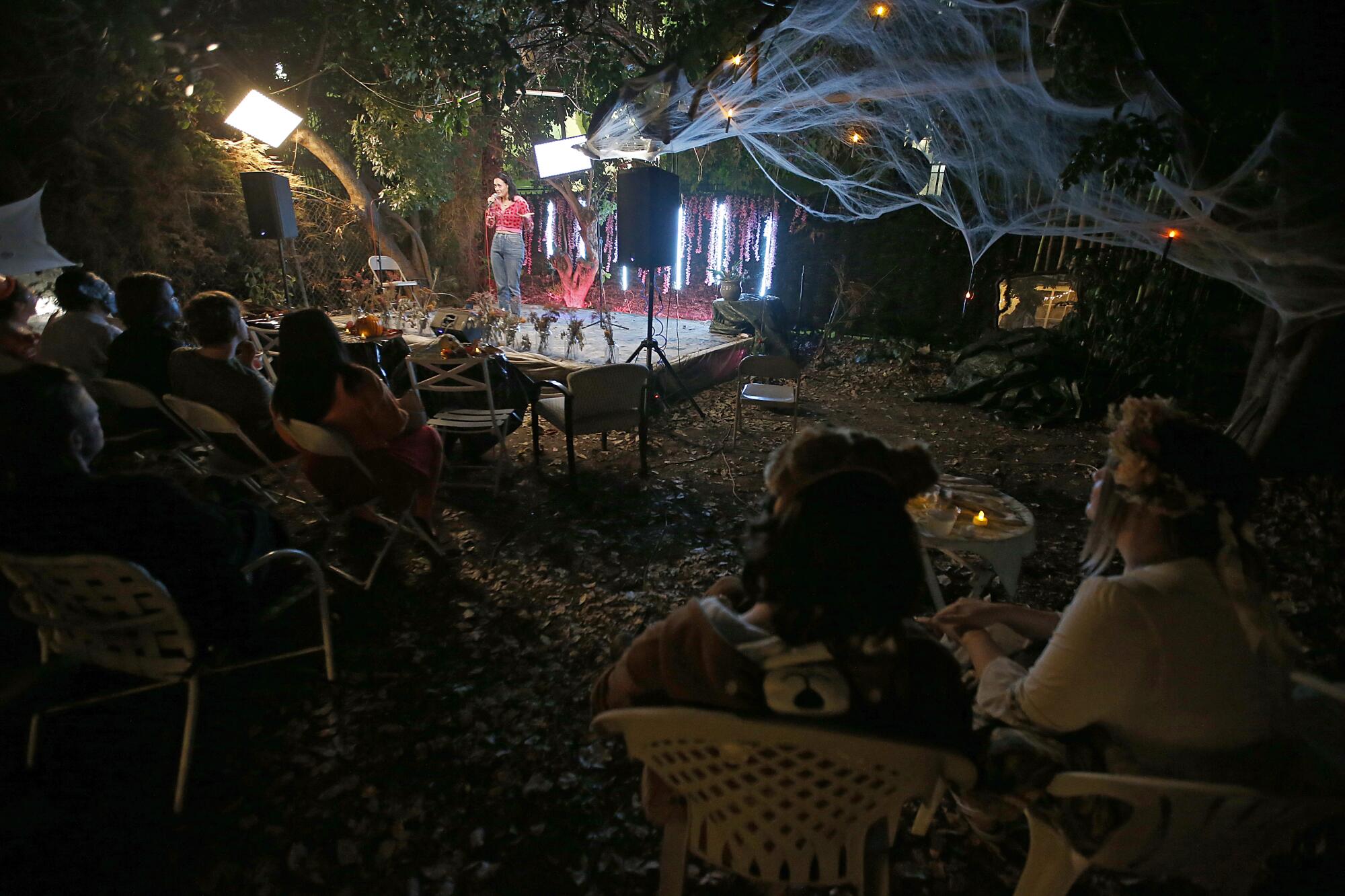
Inside a home in a quiet, residential neighborhood in L.A., a growing crowd sprouts in a living room lined by tables for indie zines and progressive community orgs. As it gets closer to 8 p.m., the audience that’s gathered for an in-the-know comedy variety show set up in the backyard is settling in for a night of alfresco punchlines and communal vibes. The home itself is modest and unassuming, which belies its reputation as one of the newest and best comedy spots in town.
On any given night at Little Secret, an underground community space birthed this year, the room is humming with spontaneity that comes from stand-up comics who create moments akin to trapping lightning in a bottle. It’s a unique combo of beloved local comedians and bold risk takers like Little Secret’s very own Brett Davis (a comedian and Little Secret’s graphic designer), working alongside community organizers like Amazon union leader Chris Smalls. For the L.A. comedy scene, it’s a continuation of a long-standing tradition of doing shows that are free from the constraints of a traditional comedy club.
No matter how cobbled together the entire operation might be, some of the very best comedy shows in L.A., for more than two decades, have happened in a comedian’s (or a group of comedians’) backyard, living room, garage, grotto, warehouse, etc.
Like warehouse raves and backyard punk gigs, the underground comedy show circuit in L.A. will never die, despite many of the best shows being short-lived. They’re usually destined to end abruptly due to excessive noise complaints, frequent visits from surly cops and angry landlords — not to mention the fear of spreading COVID-19.
Thankfully, many of the folks putting on shows outside traditional comedy clubs are trying to keep them alive as long as they can, taking cues from other shows that have gone extinct.
“It’s awesome as long as it’s awesome,” says Paul Danke, one of the trio behind legendary comedy house show the Comedy Garage. The now-defunct show was a charmingly ragtag monthly affair, anchored in the garage of a house underneath the Hollywood Burbank Airport flight path. Danke, along with co-creators Sean Green and Cornell Reid, kept the show going for eight years, helping to launch the careers of respected acts like Kyle Kinane and James Adomian on their synthetic-turf-covered stage.
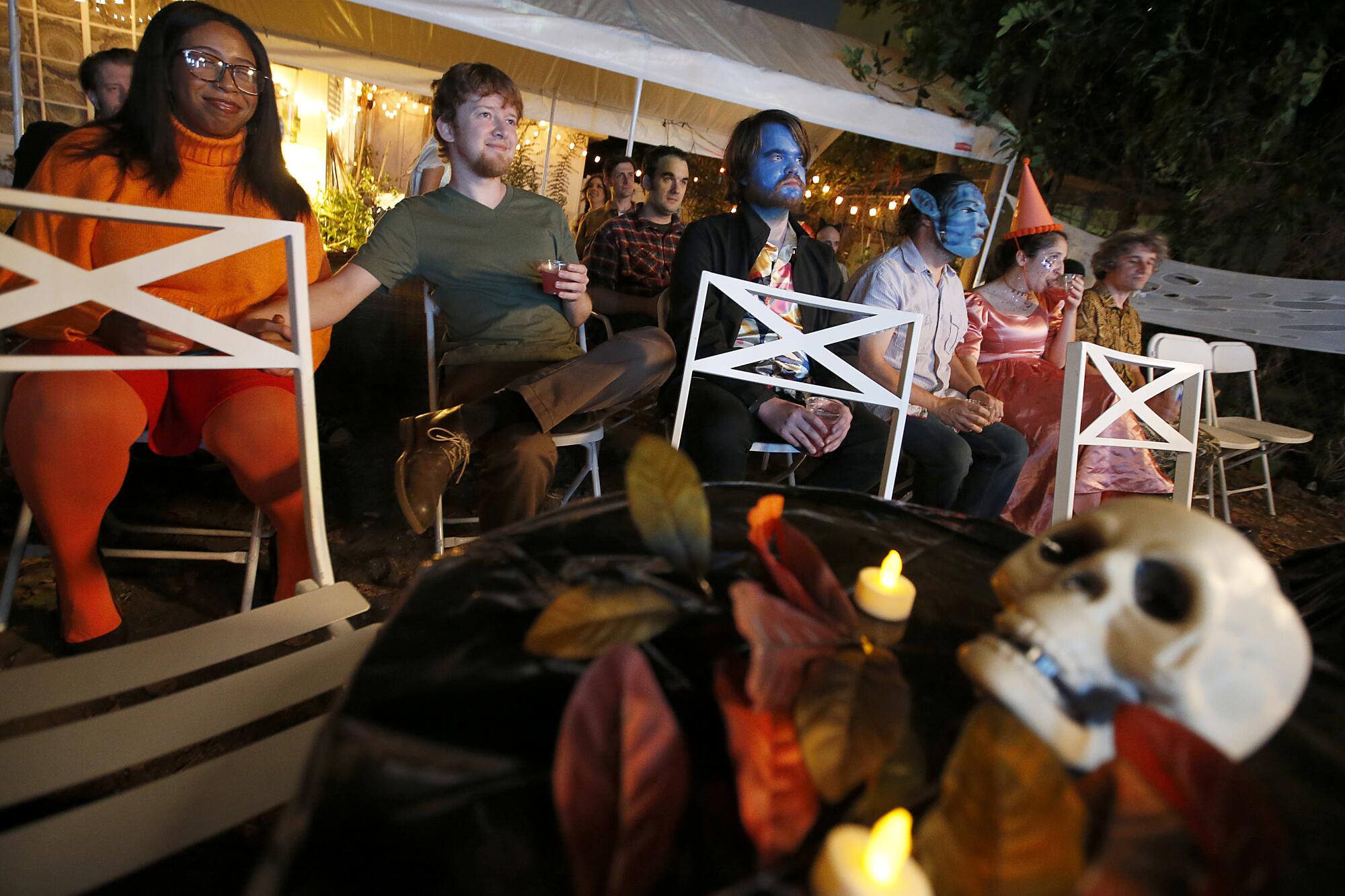
Being under an airport flight path requires all affected houses to have double-pane windows, which allowed the Comedy Garage to avoid too many noise complaints — though it still had its share of run-ins with police officers showing up at the door to pull the plug. “That’s the problem with backyard shows. They’re impermanent,” Danke says.
Today, the punk rock, “Field of Dreams” spirit of the Comedy Garage and its West L.A. contemporary, the Comedy Car Hole, is alive and well thanks to an even more community-focused breed of house shows.
Adam Sloves, Moses Goldfarb, Joshua Levy and Matt Bell carry the torch faithfully with their beloved creation, Sellout Comedy. Formerly known as Meme Money IRL in a different house in Echo Park, the shift came when the show’s creators decided to regroup and rebrand themselves after a member of Meme Money IRL died near the beginning of the pandemic.
In addition to having a giant backyard, all the members of Sellout work in various facets of film and TV production, giving them the skills to properly showcase recorded bits they’ve made as well as their own stand-up. They showcase their favorite comedians in L.A., so they make sure their friends who show up are guaranteed to have a good time. Most people who’ve ventured to their backyard have been surprised to find a full-scale show with many of L.A. comedy’s current favorites working their way through the scene (Steph Tolev, Asif Ali, Simon Gibson and Felicia Folkes, to name a few).
Sellout’s creators also take pride in the fact that their neighbors regularly come and enjoy the show. They take up all the chairs at a typical Sellout Comedy show and any overflow can stand or sit on an ample amount of grass. The only thing missing is a campfire to gather around.
“It’s really cool when I don’t have to beg my friends [to come and show up],” Sloves said, especially since so much of the Sellout team’s blood, sweat, tears and money go into the show. They put all the chairs on a credit card and make sure comics are paid, but they have yet to make money from the show.
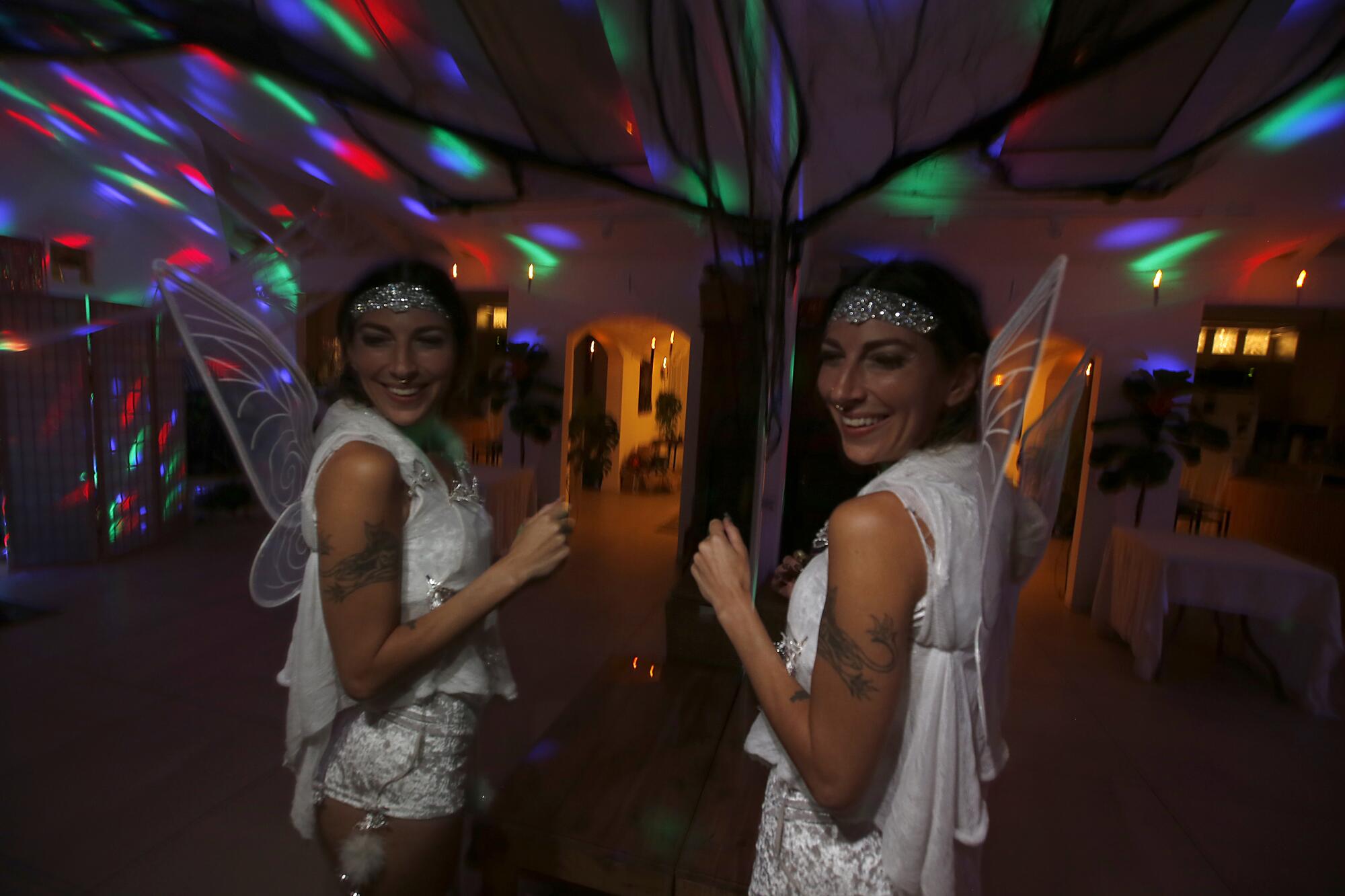
Of course, DIY endeavors like these are usually never about the money, which seems to correlate to the magical, unforgettable experiences that these spaces and shows provide. A local house show called the Big One, typically held monthly in Highland Park, steps up even further in this regard.
The Big One is the creation of recent L.A. transplants Carly Kane, Meg Indurti, Broderick Baumann and “Saturday Night Live’s” new hire Molly Kearney — who made headlines as the show’s first nonbinary cast member. From the get-go, the four had the perfect setup of a hand-built stage, a plethora of folding lawn chairs normally used by hype-beasts camping out for the latest sneaker drop and a wet bar situated almost too perfectly in their backyard. Kane says, “This space was begging us to do a show” when they all came upon it in their search for an L.A. home coming from Chicago in 2021.
The monthly gathering is every bit the magic you’d want out of a house party comedy show, but also manages the balance of a well-oiled operation. Tickets are sold, production responsibilities are well defined and accounted for and comics are paid more than they are at most stand-up showcases anywhere in L.A. Indurti attributes their success to “a good job curating a lineup that isn’t similar to a lot of L.A. lineups — heavy male, heavy white, heavy straight. I think we do a good job of making a lineup that people want to see,” she said. “It’s like a party and that’s why we have a dedicated audience that likes to come.”
Sarah Squirm, who is starting off her second season on “SNL,” kicked off the Big One’s inaugural show in 2021. Baumann, the show’s photographer and tech, quips, “Sarah Squirm did our first show, so basically our show is a fast track to ‘SNL.’”
More impressively than booking an immediate hit show in your backyard and paying comics and yourselves is giving remaining proceeds to organizations in need. The Big One donates to Feed the Streets, which serves those in need in L.A. It’s the evolution of the community focus at the core of local comedy’s underground spaces.
Though it’s still a bunch of comedy folks living under one roof and pulling together whatever they can with the possibility of eventually being displaced, the sky still seems to be the limit right now when it comes to its success. “I think that’s the beauty of it. We don’t know what it will be and it changes with the times,” Indurti says.
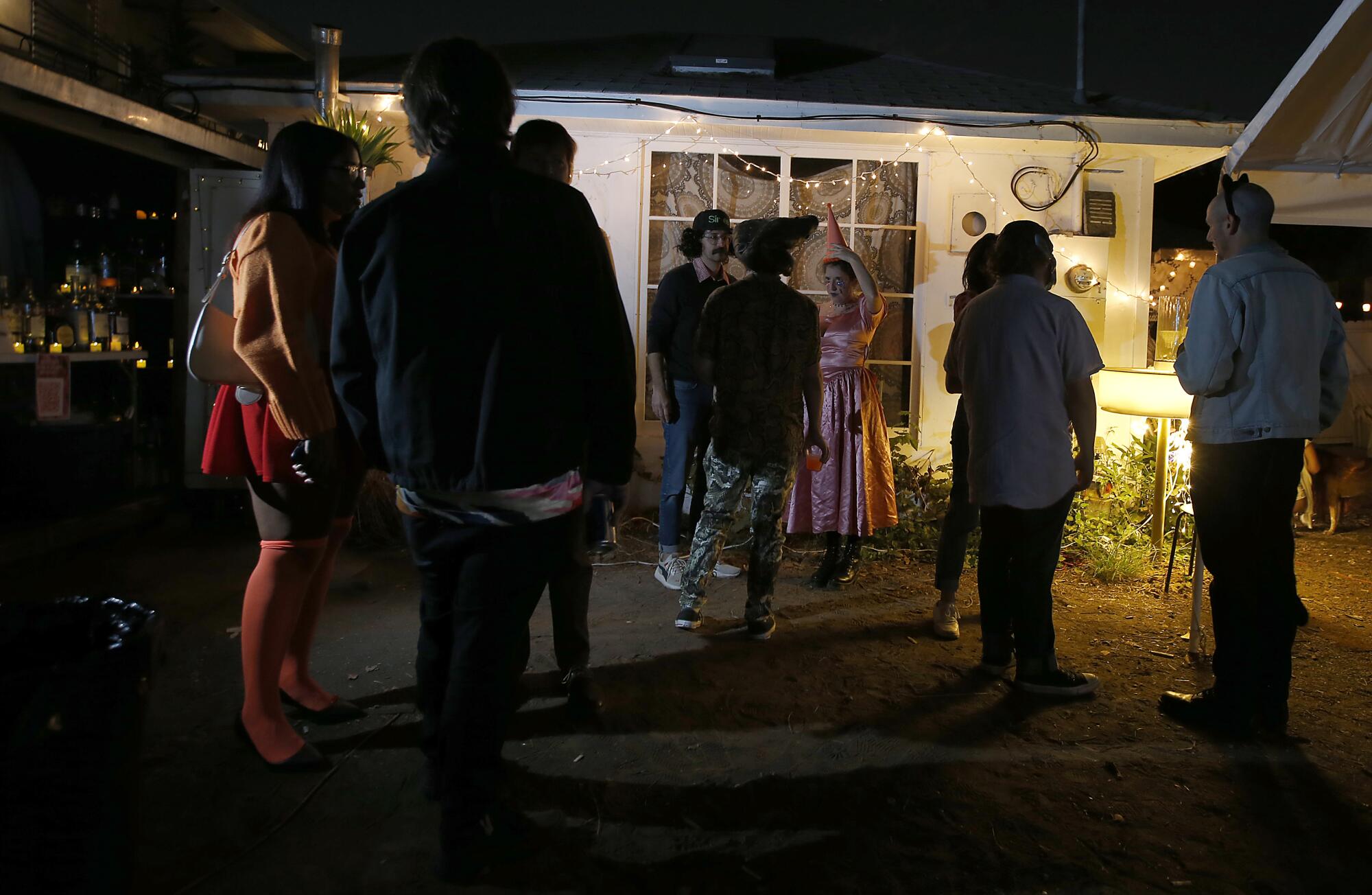
Little Secret founder Devon Young has a background in community organizing and event planning at alternative spaces and came to L.A. last year with the hope of creating a venue that was not only special but devoid of egos, a champion to crucial organizations and, most importantly, sustainable. “If your space is guided by your desire for clout and stroking your ego, it ultimately will collapse or cause harm,” Young says.
After six months of living out of her car and digging out of her own pockets, she landed the perfect space in “Netflix Valley” — the label given to a certain big-box, corporate part of Hollywood by Adomian at a recent Little Secret show. The big, glowing letters of multinational media conglomerates pervade the Hollywood sky, and the streaming giant has definitely made its mark with several such buildings in and around Sunset Boulevard.
In a relatively short amount of time, Little Secret has been host to a plethora of music-comedy variety shows, as well as evenings dedicated to platforming such organizations as the LA Tenants Union, Stripper Strike Noho, L.A. City Council candidate Hugo Soto-Martínez and Marianne Williamson.
Often, the entertainment and the community orgs and causes are cross-pollinated. Young has dreamed for this to be the perfect setting for organizers and people who desperately want to make a change. She wants them to both enjoy themselves with gems of music and comedy in L.A. and also build relationships with each other. Now that her vision has come to fruition, she gets messages every week about people getting active with specific calls to action from seeing a group like membership-based union, the Debt Collective.
“I enjoy bringing an element of authenticity to Hollywood,” Young adds. From top to bottom, everything is sourced from the neighborhood and friends, but it’s so well organized and executed that Little Secret feels more than just a party and a hang, but something that will be remembered in future oral histories of the L.A. comedy scene.
DIY comedy shows put together by scrappy, rent-paying comics is one thing, but would a comedian who owns his own home dare ruin it by hosting a show?
Enter: comedian-director-comedy historian Paul Provenza. The veteran comic and owner of a self-described “humble abode” has enthusiastically presented live comedy for the last several months for folks in his social circles. He streams it through the platform Nowhere Comedy, run by its co-founder, another accomplished comedian, Ben Gleib.
When Provenza was on the rise as a stand-up in the ’80s, indie pop-up shows weren’t as prevalent as they are today. Comedy did happen at people’s houses back then, but it would be the sort of arrangement where Lakers owner Jerry Buss would pay you a lot of money to perform at Pickfair in stark contrast to everything mentioned above, Provenza remembers.
“I hate the comedy business, but love comedy,” he says. That is the ethos that drives his private showcase, dubbed the Green House, with the added benefit of Provenza’s track record and reputation in comedy.
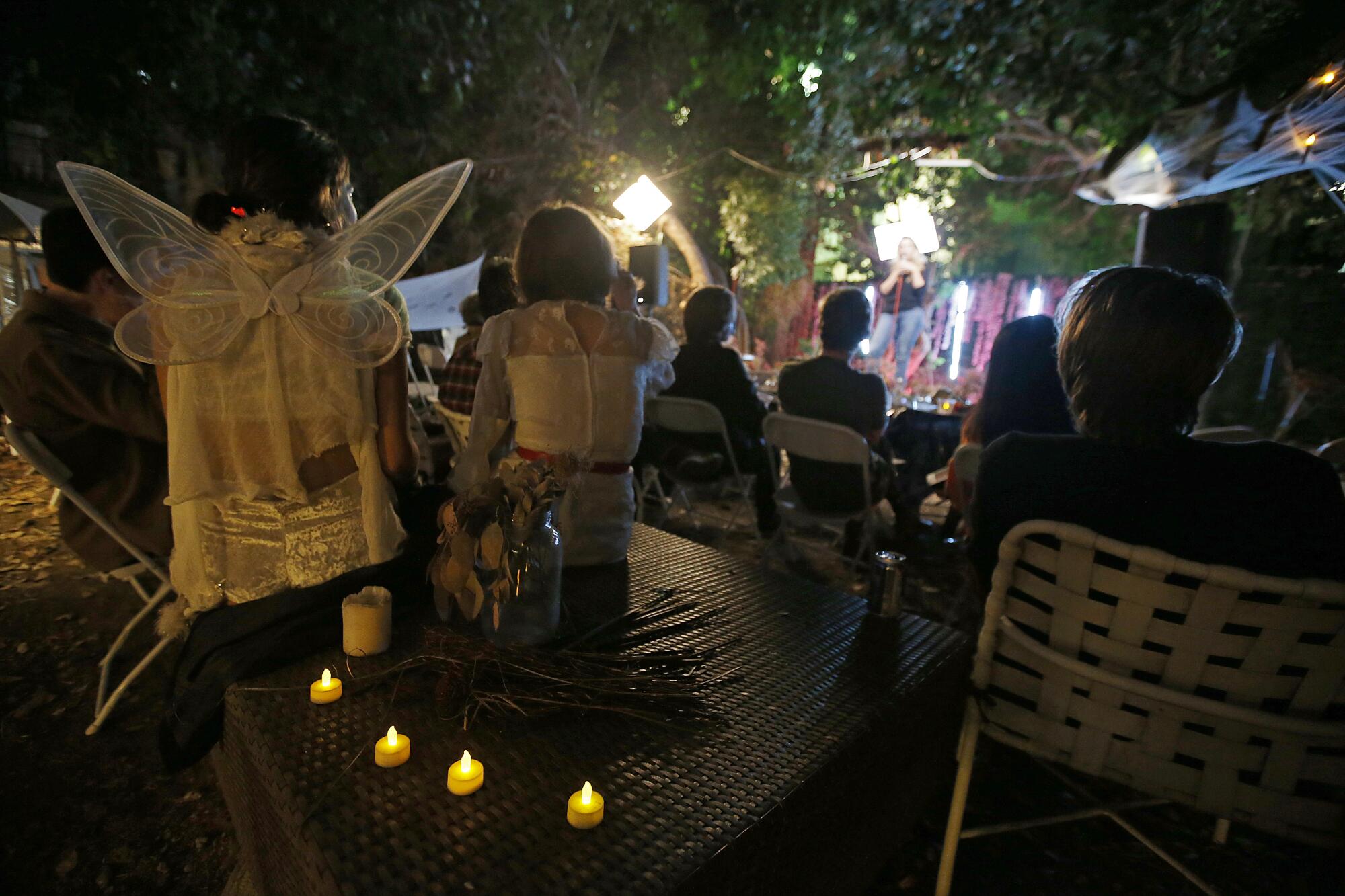
Provenza’s house in the San Fernando Valley is far from the cool kids comedy scene of the Eastside. However, the residence is so private that getting away with doing shows is fairly easy. It’s also a marked difference in quality from all the comics who split rent and then also put on a show in a backyard. Thus far, the Green House (essentially a real-world spinoff of Provenza’s Showtime series “The Green Room With Paul Provenza”) has put up live editions of the Green Room, solo shows fresh off runs at the Edinburgh Festival Fringe and charity benefits for Abortion Access Front and the Kurt Vonnegut Museum and Library.
“We love everything alternative,” said Babs Romen, longtime collaborator and friend of Provenza’s. “Everything that has a bunch of rules usually turns up pretty generic.”
Romen and Provenza [Full disclosure: In the past I have consulted and helped produce shows at the Green House, following my suggestion that Provenza should do shows in his backyard] have worked the Green House into a dream scenario of cool hangout and comedy shows.
Kelly Carlin, a descendant of comedy royalty George Carlin, is a fixture at many of the shows, along with her friend circle of intellectuals and artist types.
Currently, you have to be personally invited (or know someone who is invited) to attend any of these shows in person, but the Green House is one of the only spaces that offers access to everyone outside its social circles via ticketed livestream through Nowhere Comedy. Anyone in the world could tune in via Zoom to watch the very special curated shows and lineups at the Green House, complete with a live audience, which is such a far cry from the oft-maligned Zoom comedy shows from mid-2020.
The indie spirit of L.A. comedy is thankfully alive and well, thriving even more than predecessors could have imagined. Not only are there the shows mentioned above, but Show & Tell, Garage Show, Freeway Funk Yard, the Sawtelle Show, Cityscape, A Comedy Show L.A., Aggressively Alive and Fresh Fish Variety Hour have also been and continue to be part of this purely community-driven part of L.A. comedy.
Even when the Comedy Garage crew had to disperse and relocate the show when the house’s landlord moved back in, they went on to find other houses and even theatrical venues to host the gig — including the Upright Citizens Brigade and Rafa’s Lounge & Art Gallery for an additional eight years following an eponymous documentary released in 2011 (you can stream it on Prime Video) by Logan Leistikow, a rare milestone for any comedy show no matter where it takes place. Never officially calling it quits, the group still occasionally performs at festivals as well, though Danke admits they probably won’t do it regularly at another house unless they’ve got a rich benefactor.
“[I] don’t want to run a venue,” Danke said. “[I’m] a comedian.”
More to Read
The biggest entertainment stories
Get our big stories about Hollywood, film, television, music, arts, culture and more right in your inbox as soon as they publish.
You may occasionally receive promotional content from the Los Angeles Times.
